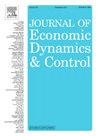CANVAS:加拿大基于行为主体的货币政策模型
IF 1.9
3区 经济学
Q2 ECONOMICS
引用次数: 0
摘要
我们开发了加拿大行为主体模型(CANVAS),它补充了传统的宏观经济模型,用于预测和货币政策分析。CANVAS代表了下一代的建模努力,其特点是在三个维度上有所增强:引入家庭和企业异质性,偏离理性预期,以及在生产网络中建模价格和数量设置启发式。扩展的建模能力是通过利用大规模的加拿大微观和宏观经济数据集,并结合自适应学习和简单的启发式来实现的。发现CANVAS的样本外预测性能与基准向量自回归(VAR)模型和DSGE模型具有竞争力。当应用于分析COVID-19大流行事件时,我们的模型有助于解释宏观经济运动以及预期形成与成本推动冲击之间的相互作用。CANVAS是央行应用的首批基于主体的宏观经济模型之一,用于支持预测和替代方案,标志着央行工具箱的进步,并丰富了货币政策分析。本文章由计算机程序翻译,如有差异,请以英文原文为准。
CANVAS: A Canadian behavioral agent-based model for monetary policy
We develop the Canadian behavioral Agent-Based Model (CANVAS) that complements traditional macroeconomic models for forecasting and monetary policy analysis. CANVAS represents a next-generation modeling effort featuring enhancements in three dimensions: introducing household and firm heterogeneity, departing from rational expectations, and modeling price and quantity setting heuristics within a production network. The expanded modeling capacity is achieved by harnessing large-scale Canadian micro- and macroeconomic datasets and incorporating adaptive learning and simple heuristics. The out-of-sample forecasting performance of CANVAS is found to be competitive with a benchmark vector auto-regressive (VAR) model and a DSGE model. When applied to analyze the COVID-19 pandemic episode, our model helps explain both the macroeconomic movement and the interplay between expectation formation and cost-push shocks. CANVAS is one of the first macroeconomic agent-based models applied by a central bank to support projection and alternative scenarios, marking an advancement in the toolkit of central banks and enriching monetary policy analysis.
求助全文
通过发布文献求助,成功后即可免费获取论文全文。
去求助
来源期刊

Journal of Economic Dynamics & Control
ECONOMICS-
CiteScore
3.10
自引率
10.50%
发文量
199
期刊介绍:
The journal provides an outlet for publication of research concerning all theoretical and empirical aspects of economic dynamics and control as well as the development and use of computational methods in economics and finance. Contributions regarding computational methods may include, but are not restricted to, artificial intelligence, databases, decision support systems, genetic algorithms, modelling languages, neural networks, numerical algorithms for optimization, control and equilibria, parallel computing and qualitative reasoning.
 求助内容:
求助内容: 应助结果提醒方式:
应助结果提醒方式:


